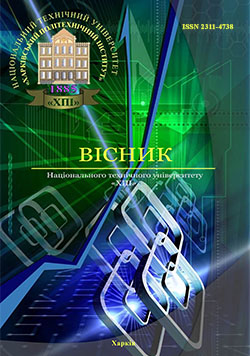INDICATIVE MODEL OF DEVIATIONS IN PROJECT
DOI:
https://doi.org/10.20998/2413-3000.2016.1173.8Keywords:
deviations in projects, model IRMA Delta, indicators, deviations, system of indicators, cognitive map, cognitive modelAbstract
The article shows the process of constructing the project deviations indicator model. It based on a conceptual model of project deviations integrated management (PDIM). During the project different causes (such as risks, changes, problems, crises, conflicts, stress) lead to deviations of integrated project indicators - time, cost, quality, and content. For a more detailed definition of where in the project deviations occur and how they are dangerous for the whole project, it needs to develop an indicative model of project deviations. It allows identifying the most dangerous deviations that require PDIM. As a basis for evaluation of project's success has been taken famous model IPMA Delta. During the evaluation, IPMA Delta estimated project management competence of organization in three modules: I-Module ("Individuals") - a self-assessment personnel, P-module ("Projects") - self-assessment of projects and/or programs, and O-module ("Organization") - used to conduct interviews with selected people during auditing company. In the process of building an indicative model of deviations in the project, the first step is the assessment of project management in the organization by IPMA Delta. In the future, built cognitive map and matrix of system interconnections of the project, which conducted simulations and built a scale of deviations for the selected project. They determined a size and place of deviations. To identify the detailed causes of deviations in the project management has been proposed to use the extended system of indicators, which is based on indicators of project management model Project Excellence. The proposed indicative model of deviations in projects allows to estimate the size of variation and more accurately identify the place of negative deviations in the project and provides the project manager information for operational decision making for the management of deviations in the implementation of the project
References
Danchenko E. B. (2011). Kontseptual'naya model' yntehryrovannoho upravlenyya otklonenyyamy v proekte [A conceptual model of integrated management of deviations in the project] Upravlinnya proektamy u rozvytku suspil'stva: tezy dop. VIII mizhnar. konf. - Project management in the development of society: abstracts of. VIII Intern. Conf, 68–70 [in Ukrainian].
Bushuev S. D., Bushueva N. S., & Khartonov D. A. (2011). Otsenka sovershenstva orhanyzatsyy v oblasty upravlenyya proektamy y prohrammamy na modely IRMA Delta [Evaluation of the excellence of the organizations in the field of management of projects and programmes on the model RMA Delta]. Vostochno-Evropeyskyy zhurnal peredovukh tekhnolohyy - East-European magazine of advanced technologies, 1.49, 4–7 [in Russian].
Bushuev S. D., & Bushueva N. S. (2003). Razvitie tehnologicheskoj zrelosti v upravlenii proektami [The development of technological maturity in project management, ] Upravlіnnja proektami ta rozvitok virobnictva: zb.nauk.pr. – Project management and production development: coll.sciences., 4, 5–12 [in Ukrainian].
Azarov N. Ya, Yaroshenko F. A., & Bushuev S. D. (2011). Ynnovatsyonnue mekhanyzmu upravlenyya prohrammamy razvytyya [Innovative mechanisms of management of development programmes]. «Sammyt-Knyha», 528 [in Russian].
IPMA Competence Baseline (ICB) for Project Management Version 3.0
Bushuev S. D., Bushueva N. S. (2010). Upravlenye proektamy: osnovu prof. znanyy y systema otsenky kompetentnosty proekt.menedzherov[Project management: fundamentals of professional knowledge and system competency assessment project.managers]. Kiev: IRIDIUM, 208 [in Russian].
Gorelova G. V., et al. (2010). Еxperience in cognitive modeling of complex systems. Vienna, 220-223.
Langacker R. W. (2013) Essentials of Cognitive Grammar. USA: OUP, 2013. 288.
IPMA Broschüre: IPMA-International Project Management Award – Assessment Based on the Project Excellence Model. IPMA 2012, Bezug über IPMA [in German]
Bushuyev Sergey D. & Wagner Reinhard Friedrich (2014). Practice notes IPMA Delta and IPMA Organisational Competence Baseline (OCB). New approaches in the field of project management maturity. International journal of Managing Project in Business, 7.2, 302-310.
Downloads
Published
Issue
Section
License
Copyright (c) 2016 Олена Борисівна ДАНЧЕНКО

This work is licensed under a Creative Commons Attribution-NonCommercial-ShareAlike 4.0 International License.
Our journal abides by the Creative Commons copyright rights and permissions for open access journals.
Authors who publish with this journal agree to the following terms:
Authors hold the copyright without restrictions and grant the journal right of first publication with the work simultaneously licensed under a Creative Commons Attribution-NonCommercial-ShareAlike 4.0 International License (CC BY-NC-SA 4.0) that allows others to share the work with an acknowledgement of the work's authorship and initial publication in this journal.
Authors are able to enter into separate, additional contractual arrangements for the non-commercial and non-exclusive distribution of the journal's published version of the work (e.g., post it to an institutional repository or publish it in a book), with an acknowledgement of its initial publication in this journal.
Authors are permitted and encouraged to post their published work online (e.g., in institutional repositories or on their website) as it can lead to productive exchanges, as well as earlier and greater citation of published work.

